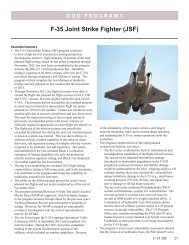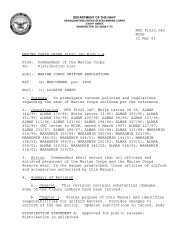Spouse Relationship and Well-Being Service Utilization for Marriage Counseling
pages-from-comprehensive_report2013.pdf
pages-from-comprehensive_report2013.pdf
Create successful ePaper yourself
Turn your PDF publications into a flip-book with our unique Google optimized e-Paper software.
2013 MILITARY FAMILY LIFESTYLE SURVEY REPORT<br />
“There were plenty of resources, but if there was ever a<br />
chance it could get back to the company, I wouldn’t<br />
consider it. I think that most military families have the<br />
same mindset. Personal issues are made public through<br />
gossip <strong>and</strong> word of mouth. No one wants their family to<br />
be in that position.” - Army spouse<br />
“<strong>Counseling</strong> will not fix problems regarding the fact that<br />
my husb<strong>and</strong> is never home even when he is not deployed.”<br />
- Army spouse<br />
When respondents were asked about which military<br />
resources they used <strong>for</strong> marital counseling, Military<br />
OneSource was cited most often (24%), followed by<br />
service-specific Military Support Centers such as Fleet <strong>and</strong><br />
Family <strong>Service</strong>s or Army Community <strong>Service</strong>s (21%) <strong>and</strong><br />
chaplains (18%). Military hospitals <strong>and</strong> clinics were used by<br />
11% of respondents, military treatment facilities (MTF) by<br />
10%, <strong>and</strong> the Family Assistance Program (FAP) by 6%.<br />
When respondents were asked to cite reasons <strong>for</strong> not<br />
seeking services <strong>for</strong> marital counseling, the majority (75%)<br />
stated that they “did not feel it was necessary.” Among<br />
both spouses <strong>and</strong> service members, “spouse refusal/<br />
resistance” <strong>and</strong> “concerns about confidentiality” were the<br />
additional top reasons <strong>for</strong> not seeking marital counseling<br />
services <strong>and</strong> were each cited by 7% of respondents. These<br />
reasons are consistent with other research as top barriers to<br />
mental health treatment within the military population. 92<br />
Communication During Deployment<br />
The quality of communication during deployment has been<br />
associated with improved family functioning. 83 The<br />
frequency of communication has also been examined <strong>and</strong><br />
there is some indication that the frequency of<br />
communication may help improve the at-home spouse’s<br />
general well-being. 84 For example, a recent study conducted<br />
by the REACH program at the University of Arizona<br />
found that e-mail was the most frequently used <strong>for</strong>m of<br />
communication used by active duty spouses <strong>and</strong> had the<br />
strongest association with general well-being of the athome<br />
spouse. 85 The majority of spouses in this survey<br />
report being able to communicate frequently with their<br />
spouses during deployments, with 25% reporting that they<br />
communicated with their service members daily. Forty<br />
percent were in touch with their service members a couple<br />
of times a week, <strong>and</strong> 14% reported communication once a<br />
week. Two-percent reported communicating less than once<br />
per month.<br />
Military Family Separations <strong>for</strong><br />
Reasons Other Than Deployment<br />
In addition to deployments, military families experience<br />
routine separations throughout the lifecycle of military<br />
careers (e.g., training, workups, detachments,<br />
unaccompanied tours of duty). In fact, in this survey,<br />
deployments accounted <strong>for</strong> roughly half of the time<br />
families spent apart. The other half was related to training,<br />
workups, detachments, <strong>and</strong> other support-oriented<br />
activities.<br />
“As a military spouse getting a master’s degree in a<br />
specialized field one of my biggest concerns is the<br />
inability to stay in one location <strong>for</strong> more than three years.<br />
Even fields that are easily transferable, such as teachers,<br />
still have to start from the bottom up every move. I have<br />
seen so many spouses quit working due to sheer<br />
frustration with the job hunt every six months to three<br />
years. The reduced earning power is drastic. We have<br />
benefited from our military service, but we will not<br />
choose to pursue this lifestyle after his time is up.”<br />
- Navy spouse<br />
Additionally, while the majority of respondents indicated<br />
that they had not chosen to live separately, or “geo-bach,”<br />
some respondents had chosen to live apart from their<br />
spouses <strong>for</strong> a variety of reasons. The top reason given <strong>for</strong><br />
“geo-baching” was spouse employment, reported by 17% of<br />
respondents. Family support (11%), child (12%) or spouse<br />
education (10%), <strong>and</strong> the inability to sell a home (9%) were<br />
other top reasons <strong>for</strong> living separately. Respondents could<br />
offer an open-ended response to this question <strong>and</strong> provide<br />
their own reason <strong>for</strong> living separately. These responses fell<br />
into the following categories: (1) financial/cost of living (2)<br />
legal issues that include separation, impending divorce, or<br />
custody issues (3) medical care <strong>for</strong> a family member (4)<br />
short or unaccompanied duty tours (5) issues related to<br />
status as a domestic partner (e.g., partner could not move<br />
with service member due to unrecognized or non-marital<br />
status), <strong>and</strong> (6) issues with citizenship or visas.<br />
Reported <strong>Service</strong> Branch Support<br />
<strong>for</strong> Military Lifestyle Issues<br />
Respondents were asked to rate their service branch’s<br />
sensitivity to a variety of key family-related issues<br />
including: (1) maintaining contact during deployment (2)<br />
awareness of support services (3) preparing families <strong>for</strong><br />
deployment (4) spouse career <strong>and</strong> (5) cutting orders around<br />
school schedules. The single highest response to this<br />
question was related to comm<strong>and</strong> sensitivity to spouse<br />
employment issues. Fifty-four percent reported that their<br />
28






